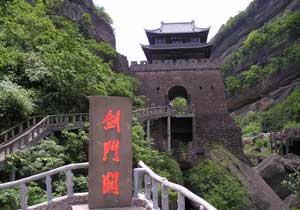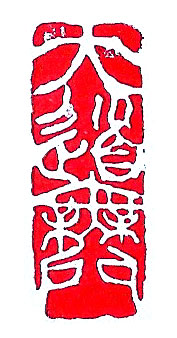In living Zen scholarly wisdom does not play an important role. There is no intention using our clever brains to put another brick into the wall of burbling ignorance, or insert another spoke into the over-full wheel of accumulated erudition. Yet it is worth while employing scholarly wisdom to pull down such walls or pull out some spokes from weisenheimer’s spinning wheel …
I vividly remember a party I visited decades ago, where someone was telling me of the “Gateless Gate”, a book full of mysterious wisdom she apparently just read. Asking about the obvious contradiction in the title, I was told Zen (she pronounced “Tsenn”) is always that way, to the outsider it sounds all contradictory. I have to transcend the “Gateless Gate”, then all issues of life will be resolved and I won’t ask such ignorant questions. Well … I decided to desert the Guardian Angel of the Gateless Gate with the excuse to get me another beerless beer, and filed “Tsenn” under “that sort of nonsense” for the time being …
Who ever had the idea to translate “Mumonkan” (無門關) with “Gateless Gate”, making Zen sound so … ohhh… mysterious and enigmatic? Let’s see how the title of this famous collection of Zen dialogues was probably meant to be understood by the author:
The last character, kan (關), means mountain pass. It evokes the image of a small and steep road climbing up the mountain to reach the other side. Such a mountain pass was of vital importance in ancient China, one had to control who comes in over the pass and who wants to escape. Therefore massive two- or three story gates, called mon (門) were often built for protecting a mountain pass. These gates or checkpoints had names patterned SuchandSuch-Gate-Pass, as Sword-Gate-Pass (劍門關), Goose-Gate-Pass (雁門關) or Strong-Gate-Pass (鐵門關).
“Mumonkan” (無門關) is playing with evoking the image of such a massive gate guarding a mountain pass, and at the same time, with it’s very name Mumon (無門) saying there is no gate. Literally translating Mumonkan would read “Mountain Pass without a Gate”, yet the text in the introduction of the Mumonkan says this Mumon is the gate to the law, to the way how things are (無門爲法門). In a wonderful ambiguity which is only possible in Chinese language we are asked: “since there is [no gate]/[this gate called Mumon], how will you pass through (既是無門、且作麼生透)?” This Mumon sounds to me a bit like Peter Pan’s “Neverland”, a “Nevergate”. And it is not just the gate which isn’t there or the gate called “Mumon”, it is also Mumon’s gate, since the author’s name is Mumon Ekai (無門慧開). I can almost see him whimsically smiling …
How couldn’t we see this way (豈不見道) Mumon asks, and continues with his much quoted verse stating the Great Way (大道) is without Gate (無門), the Great Way (大道) passes through this Nevergate (無門): 大道無門.
—
(Not only) Scholarly Appendix: “Weisenheimer” is my ever favourite German sounding word in the English language. It is not really a Germanism, since this word is yet not (or not yet?) part of the German language. Talking of German language, the novelist Franz Kafka was telling us of just another gate in his parable “Vor dem Gesetz (Before the Law)”. Kafka’s gate to the law (法門) stands wide open and won’t be closed by the gatekeeper until the life of the very person for whom the gate was made to pass through ended, waiting outside. I read this (my ever favourite Zen story) as a warning, 豈不見道? Let’s go!

